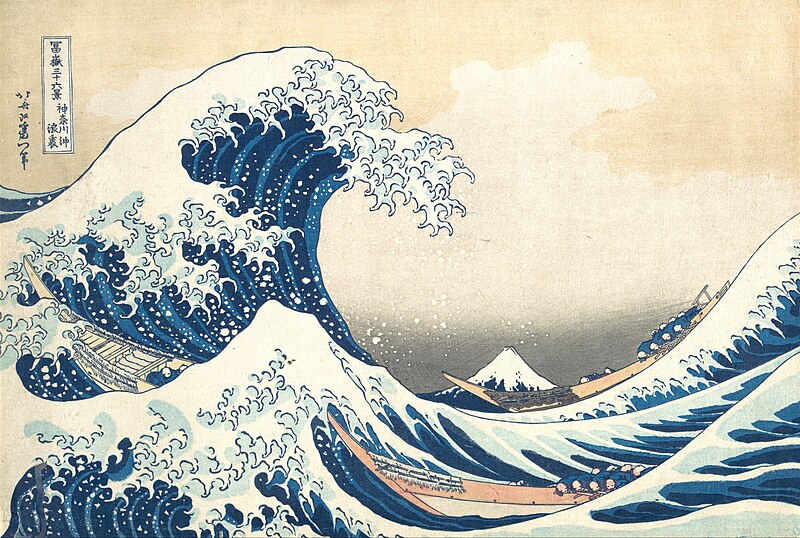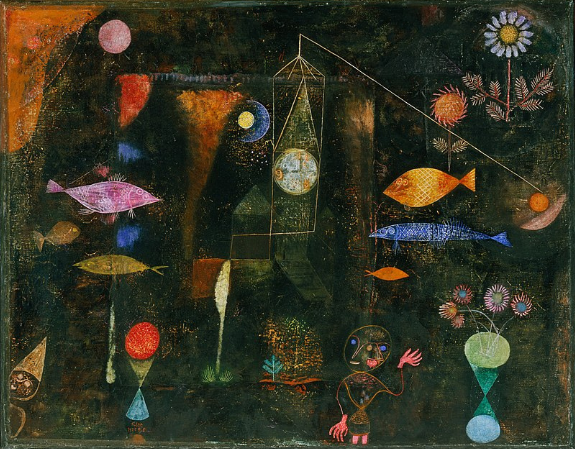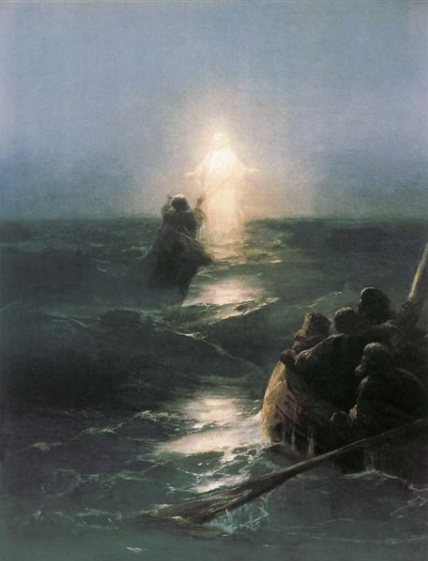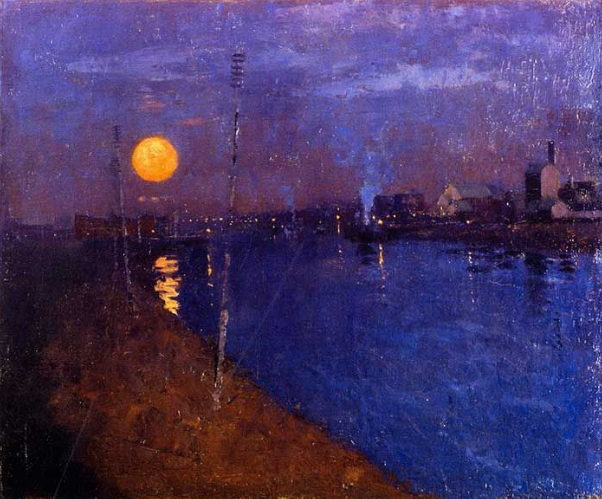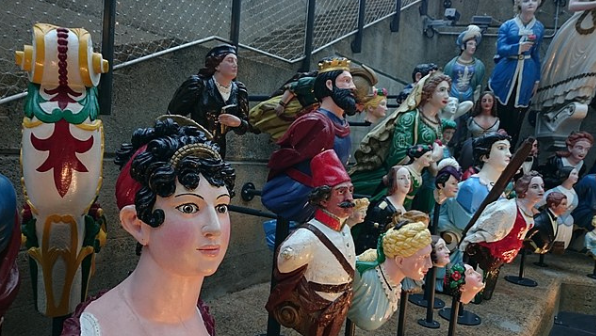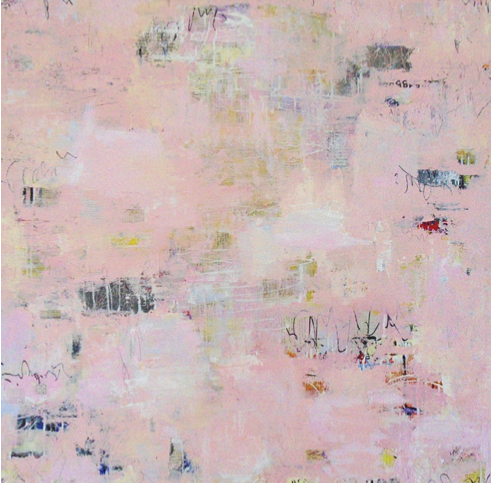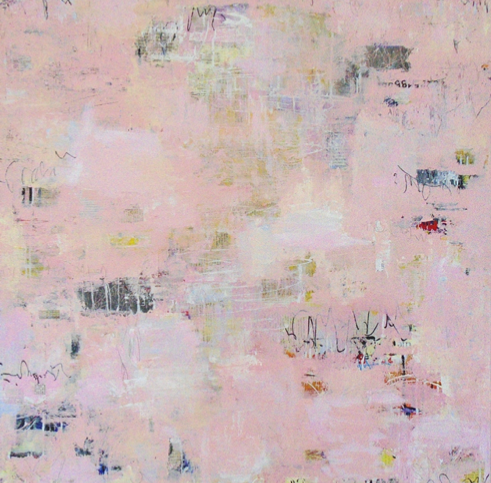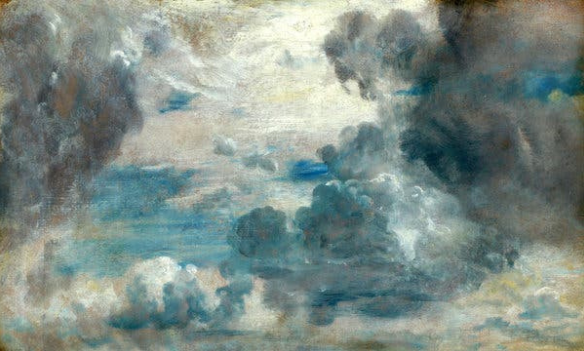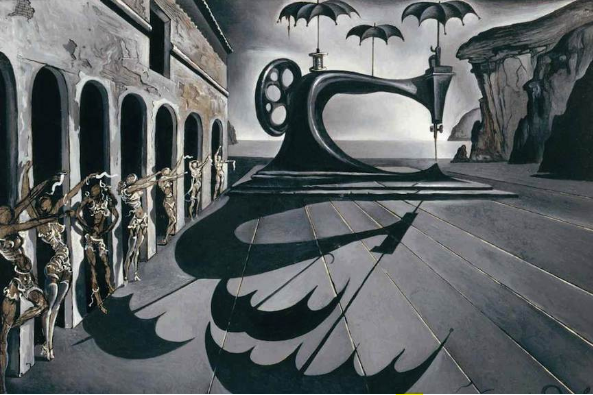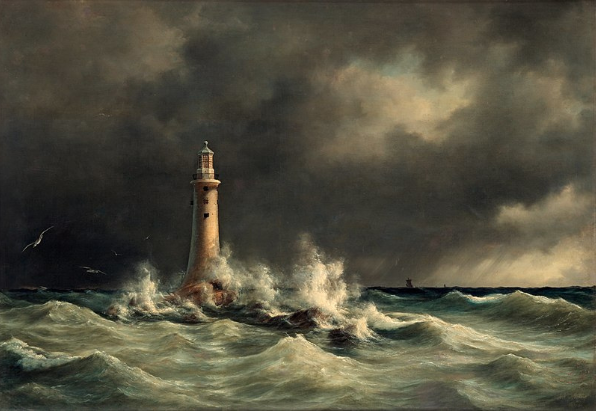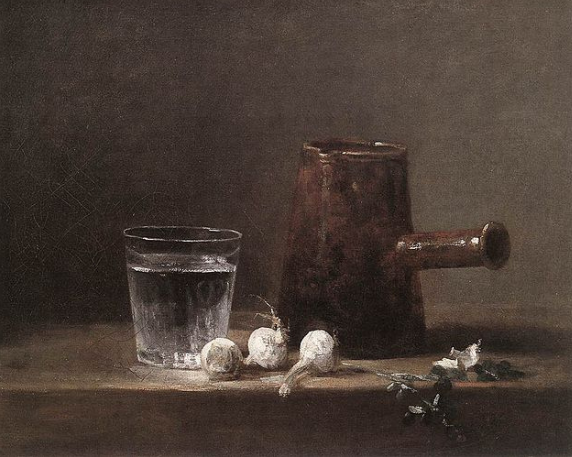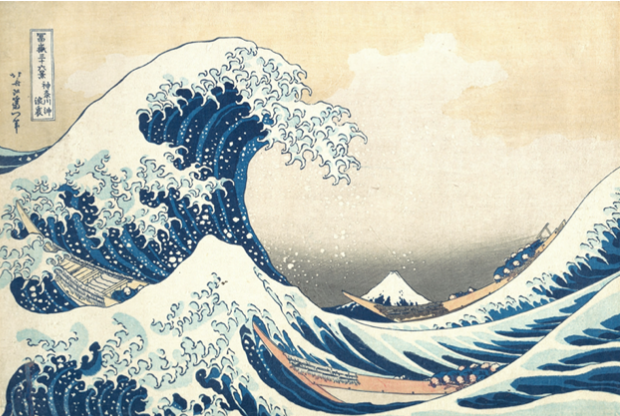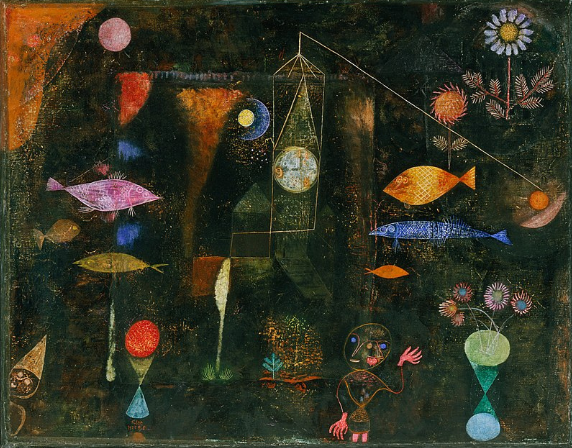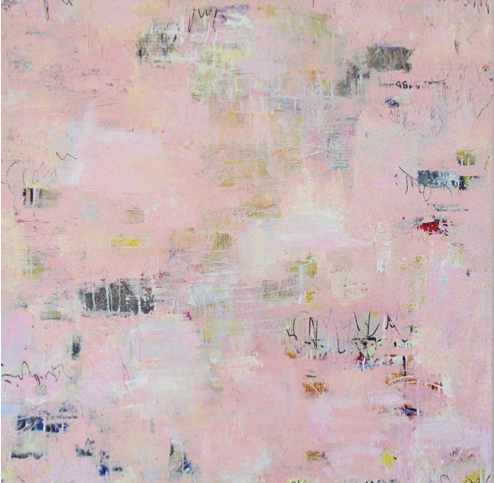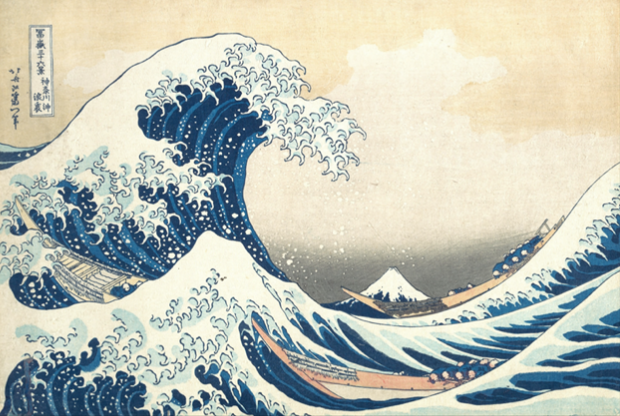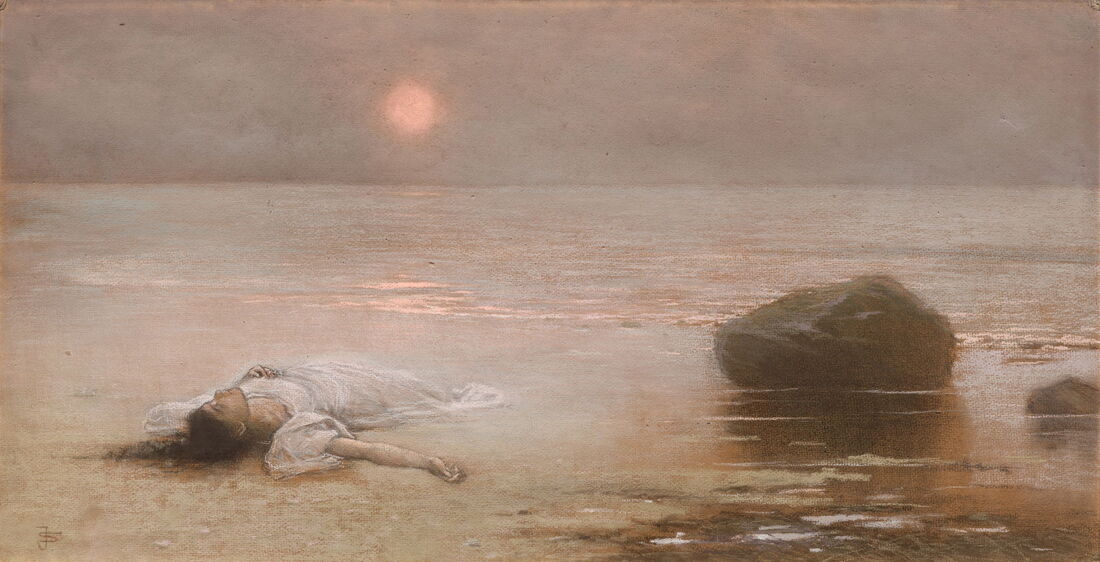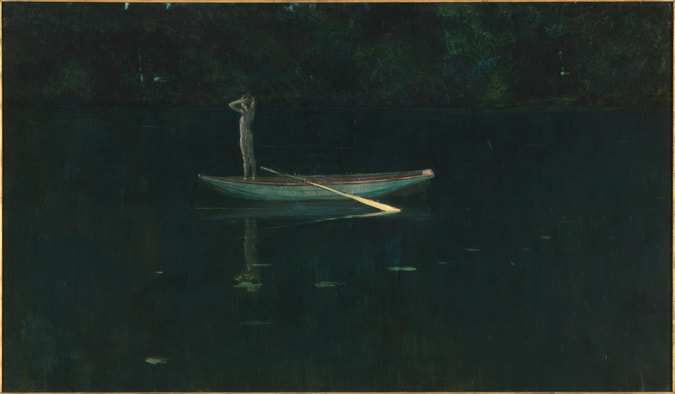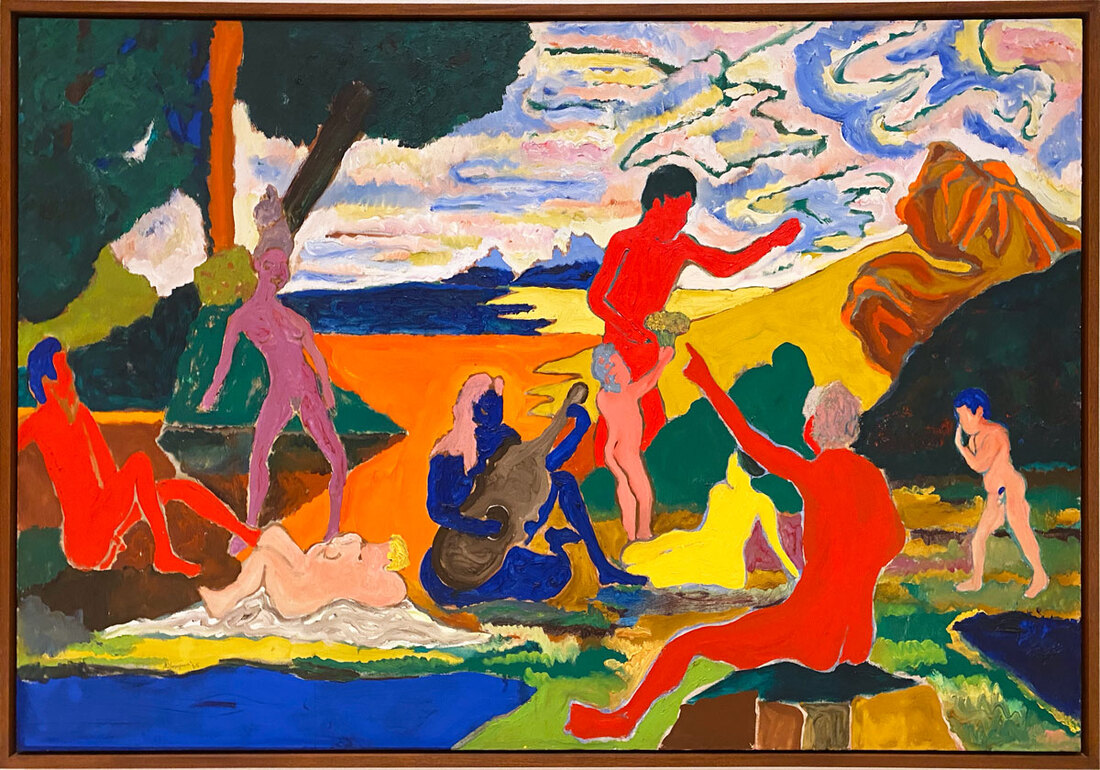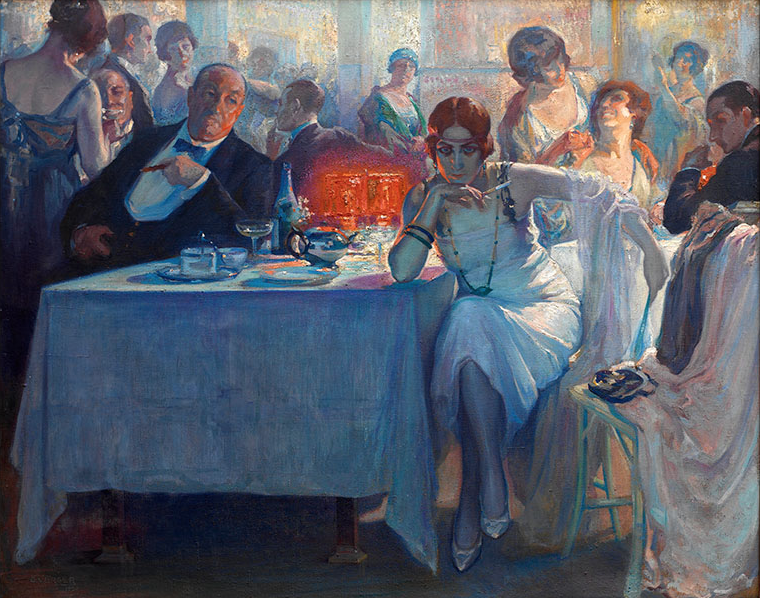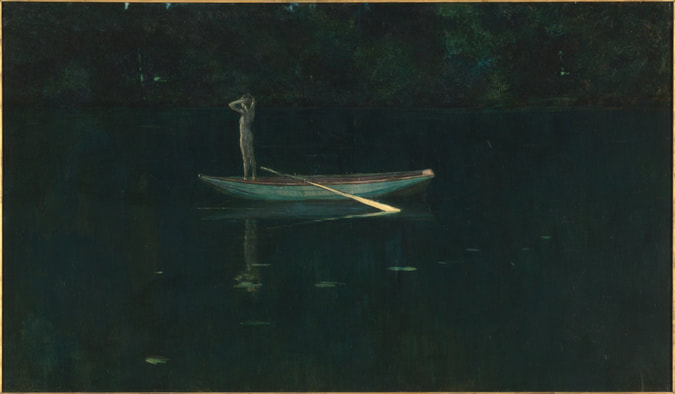|
The Ekphrastic Review says a big congratulations to Kimberly Hall, whose poem, "Three Symphonic Sketches" has won the Water contest! Thank you to Kimberly and to all of the wonderful finalists below, and to every single one of you writing to these curated thematic collections. I am especially thankful to Sandi Stromberg for her time and consideration and for this important work. All of the reading for this contest was done blind. So we were surprised by the results after deliberations. Several finalists had more than one work in the top 20. The winner, Kimberly Hall, had three! Also surprising was how many of the finalists wrote to the same work of art. There were 50 choices to write about, but so many great pieces after the famous Great Wave painting, Klee's painting, the moonlight on water work by Henry, and my own abstract work, A River Without Water. While a wide variety of the works showed up in the entries, a few inspired many to write wondrous things. The finalists' works are shown below in alphabetical order by name, with Kimberly's winning poem first in the sequence. We thank each and every one of you for reading these writers, for sending your submissions, for supporting the journal, and for making this community so amazing. THANK YOU. Lorette ** Congratulations to everyone who entered the Water contest, and of course, to the finalists and the winner. I loved immersing myself in the myriad responses. I read each and every piece several times with appreciation for each writer’s thoughtful and compelling work. Then, I faced the challenge of making selections. Kimberly Hall’s “Three Symphonic Sketches” rose to the top for her ability to capture the symphonic sound of Hokusai’s Great Wave. But please read all the selections presented here. Each one invites us to experience more deeply the chosen work of art. Sandi Stromberg ** The Finalists The World to Come, by Valerie Bacharach The Catch, by Lizzie Ballagher The Glasgow Boy Speaks, by Lizzie Ballagher Icons, by Portly Bard A River Without Water, by Portly Bard What my glass-half-empty eyes see…by Dorothy Burrows Rain God Vessel Lamentation, by Helen Freeman Nightfruit, by Julia Griffin Haibun on A River Without Water, by Kimberly Hall Portents: Haiku, by Kimberly Hall Three Symphonic Sketches, by Kimberly Hall (First Place Winner) The Shadows, by Amy Holman Eddystone Lighthouse, by Anton Melbye (Denmark) 1846, by Sue Mackrell Canticle of Dreams, by Mary McCarthy A glass of words from the kitchen tap, by Sandra Noel What the wind knows, by Sandra Noel The Mariana Trench, by Barbara Ponomareff the river's slow face, by Janet Ruth Writing with Hokusai, by Janet Ruth Final Sky, by F.F. Teague First Place Winner!!!! Three Symphonic Sketches In 1905, composer Claude Debussy requested that the image of Hokusai’s Kanagawa-oki Nami Ura be printed on the front cover of the published score of his newest orchestral work, titled La mer; Debussy kept a copy of this artwork in his studio, and used it as inspiration. I. First, a wash of colour. Shimmering harps and strings like sunlight soar high above the waves, bass and bass drum rolling steady beneath them. Chords and motifs dissolve into a soundscape of blue – brisk blue wind over bubbling blue water, light flutes and dark bassoons and boundless rippling cellos – all watercolour and ocean spray, blossoming against the horizon. a cloudy spring haze – seawater and sunrise meet, claws crest and retract II. Second, the scherzo. Not just colour, but movement. A strange and glittering dance with ever-changing steps. Phrases seem to shape themselves – texture and timbre toss each other in and out of earshot, with a sort of playfulness that cares not whether it leads its listener to familiar shores or into unfamiliar depths. foam like dragons’ pearls, dancing on the waves – waves that scatter boats like fish III. Finally, the storm. Horns and trumpets, rumbling first and then growing, growing, as a growl grows into a roar. Wind and bass and brass and strings – the whole orchestra strengthening into a swell, swelling into a surge – surging into a thunderous chorale that reaches up through the mouth of a distant sea and brings the great wave to life. the sea-god wakes, and between its curls – the dawn’s first glimpse of Mount Fuji Kimberly Hall Kimberly Hall (she/her) is a queer and neuro-divergent poet and writer. She received her master's degree in behavioral science from the University of Houston-Clear Lake. Her poetry and prose can be found in online publications such as First Flight, Sappho's Torque, and Equinox, as well as in several ekphrastic poetry anthologies and a brand new anthology from Mutabilis Press. She still gets the idiomatic butterflies whenever anyone mentions these things where she can hear them. The World to Come An imperious galaxy holds multitudes. A clock ticks past and future as gold and cobalt fish swim in random patterns of here and gone, return and leave. See the mother with her two faces, heart-shaped mouth when she remembered love, the other all blank eye and shuttered lips. A vermillion fish, nostalgic for its beginning, glimmers. The clock ticks star and planet while flowers sprout in scented water, spread their leaves and petals. See the mother’s upraised hand, empty of names. The moon eats the sun, the clock spins eternity, fish dazzle in the darkening sea. Valerie Bacharach Valerie Bacharach is a proud member of Carlow University’s Madwomen in the Attic writing workshops. Her writing has appeared or will appear in publications including Pittsburgh Poetry Review, Pittsburgh Quarterly, The Tishman Review, Topology Magazine, Poetica, The Ekphrastic Review, Talking/Writing, and Vox Viola. Her chapbook, Fireweed, was published in August 2018 by Main Street Rag. The Catch Hungry, still, for solitude, he sent us off across the lake ahead of him: went aside alone, this time, to meet with God, his Father. Reluctantly, we rowed away, hauled, heaved against the growing surge of angry waves that sent us floundering, spinning, helpless on the disfigured face of Galilee’s wide water. We tasted terror then, tormented by the force of wind that clenched our innards, pitched us into Sheol’s deeps, dashed us down the crags of water into the gnashing teeth of a storm. Now: how in a towering tide & torrent were we to fare without our Lord? The mast curved over, sang out, whined. Our puny rudder failed. The sail sprang out & snapped, tore, flashed away into a squalling wind until we bawled in fear of death, shouted, eyes shoreward, that we saw an apparition. And yet, no phantom it was but Christ himself in very flesh walking the rage & roar of wave-crests, holding wide his all-embracing arms to clip & keep us in. No catch of fish more dear to him! We understood at once he was the Everlasting One, He who then cried out to us: Cannot I who hurled stars across the void, who brooded over deep primeval waters-- cannot I, radiant over chasms of blue darkness, now walk across this wildness so to find you, call you home? Lizzie Ballagher In 2022, Ballagher was chosen as winner in Poetry on the Lake's formal category with a pantoum entitled ‘Across the Barle’. Her work has appeared in print and online on both sides of the Atlantic; it has also been presented in podcasts on Poetry Worth Hearing (Anchor fm). Several of her poems in the last two decades have, too, been set to music. Contributing regularly to Southeast Walker Magazine, she lives in the UK, writing a blog: https://lizzieballagherpoetry.wordpress.com/. The Glasgow Boy Speaks, 1887 River Landscape by Moonlight, George Henry, 1887) South o’ the border all the blether’s now aboot Victoria’s Golden Jubilee, while here in the North Countree men gang up long before the skreich o’ day tae drive haem rivets, slave at smelting lums along the Clyde-- and all tae keep her majesty in a style she is entitled tae (they say) with Sassenachs and swaggering lairds who think we’re teuchters-- gyte as the moon that sinks down tae the river-- clarty by our guid labours… Yet, open up your een, ye glaikit southren folk, and see the braw dance o’ light even in the scribble of an antic moon, the reek o’ blazing furnaces-- the heft o’ steel and coal; the sweat on backs o’ men bowed doon…. Here winter days are nae sae lang, so we mun keek wi’ inner een tae find the brilliance o’ bonny light in darkness. Lizzie Ballagher Glossary blether gossip, chat gang go skreich o’ day daybreak drive haem drive home lums chimneys Sassenachs the English teuchters rough characters gyte mad clarty dirty guid good een eyes glaikit gormless, empty-headed braw brave, beautiful nae sae lang short mun keek must look Icons These once the pride beneath the prow of storied wood from stern to bow are now but remnants left to gauge the wonder of their golden age when keels beneath the waterline would harness wind above the brine in timbered sails to brave the roar that souls defiant dared explore by going west to reach the east believing waters never ceased, that plane ordained they ought to fear was more illusion wrought by sphere and spirit by which they were led was more than merely figurehead. Portly Bard Old man. Ekphrastic fan. Prefers to craft with sole intent... of verse becoming complement... ...and by such homage being lent... ideally also compliment. Ekphrastic joy comes not from praise for words but from returning gaze far more aware of fortune art becomes to eyes that fathom heart. River Without Water I see the bottom of a heart imagined as ravine where love is intermittent rain it always seems between and idle dreams are fragile shards that peek from coral sand as precious trove of treasured lore enduring close at hand yet better left where widely strewn, assembled unrestored, in art that gives them homage due, but leaves them unexplored, accepted as the arid pain where scars were etched...and will remain. Portly Bard Old man. Ekphrastic fan. Prefers to craft with sole intent... of verse becoming complement... ...and by such homage being lent... ideally also compliment. Ekphrastic joy comes not from praise for words but from returning gaze far more aware of fortune art becomes to eyes that fathom heart. What my glass-half-empty eyes see… Upon an ink-blotched river, shimmering oil spills, patches and traces of chemical trash. A concrete walkway, cracked and lifeless; still harbouring the trunks of two dead trees. From old warehouse bones smart apartments, well-lit; but no brightness for the homeless. Against the urban skyline, from pyres of wrecked cars, a suffocation of thick smoke; the shiver of celestial sharks, their ghost-fins splashing in a boiling, rising ocean. A gigantic plastic orange, air-swept, bloated; bobbing uneaten above sick coral… the harvest moon. Dorothy Burrows Based in the United Kingdom, Dorothy Burrows enjoys writing flash fiction, poems and short plays. Her work has been published by various journals, including The Ekphrastic Review. For some years, she travelled to school on a ferry boat. Rain God Vessel Lamentation It’s this stance I’m forced to hold, my left knee aches, my right elbow too and I worry about the onset of arthritis. My moustache needs a trim, coyote headdress smells of squirrel, ringed eye openings skew my vision and a developing fracture surely spells trouble. They told me I’d be given a club and shield to supplement my four remaining fangs, but to say I’m gutted at their size is an understatement – almost like a watch and pen which would have been more use. Guess I’m not too sure why I need them. Nobody asks me what I want and aren’t I the god here anyway? Can someone please fill this water container or at least dampen me with mist and spritz me with dew? I long for clouds to subdue my surroundings like an arctic cloak and slick my cheeks with moisture. Mother of Jesus, tell them to fill me to the brim. Let me be drenched, overflowing, hailed by farmers and warriors, prophets and priests, parents and children the world over. Endue me, for pity’s sake, with even one drop of real power. Helen Freeman Helen Freeman started writing poetry during recovery time from a serious road traffic accident in Oman and got hooked. She has been published in several magazines and supplements including with Corbel Stone Press, Ink, Sweat and Tears, Clear Poetry, Algebra of Owls, Ground Poetry, Your One Phone-call, Open Mouse, Red River Review, Barren Magazine, The Drabble, Sukoon, Poems for Ephesians and The Ekphrastic Review. Some of her ekphrastic poems were published alongside related Diane Rendle paintings at an exhibition in Open Eye Gallery, Edinburgh. She taught English for many years in Kenya, Tanzania, Oman and Dubai and now lives in Durham, England. Nightfruit So the bright orange Scribbles itself by night Into the deep blue: Beauty of Seville, Framed as a secret Spanish Exclamation point¡ Julia Griffin Julia Griffin lives in South-East Georgia. She has published in Light, Lighten Up Online, Snakeskin, and some other magazines. Haibun on A River Without Water Dry wind carries no water across these still beds. What was once bright and fertile now hears only the echo of rain, holds only the memory of flood. Scraps emerge like phantoms in the night. Feet splashing, a wet rush of blood, ripples and riptides and roaring thunder – shadows, sluggishly crawling out from darkened desert, coming to rest against eager palms. Scraps, like phantoms, dissolve once more, crumbling to dust in the hot white light of day. no thirst is quenched by memory alone – where dreams run instead of rivers. Kimberly Hall Portents: Haiku morning overcast – clouds like honeycomb, now sweet, hold tomorrow’s storms Kimberly Hall The Shadows It’s raining bullets in 1941, and the seamstress whores are waving white handkerchiefs in a chiaroscuro of recruitment and sympathy. The machines are shielded from the commands for pleats and A-lines, fitted; a waste. The seamstresses are lonely, Surrendering their men to Franco Amy Holman Amy Holman is a poet, literary consultant and artist. The author of five poetry books, including the prizewinning chapbook, Wait for Me, I’m Gone, from Dream Horse Press, and the collection, Wrens Fly Through This Opened Window, from Somondoco Press, her poems have recently appeared in The 5-2: Crime Poetry Weekly, The Chiron Review, and The Night Heron Barks. Eddystone Lighthouse by Anton Melbye (Denmark) 1846 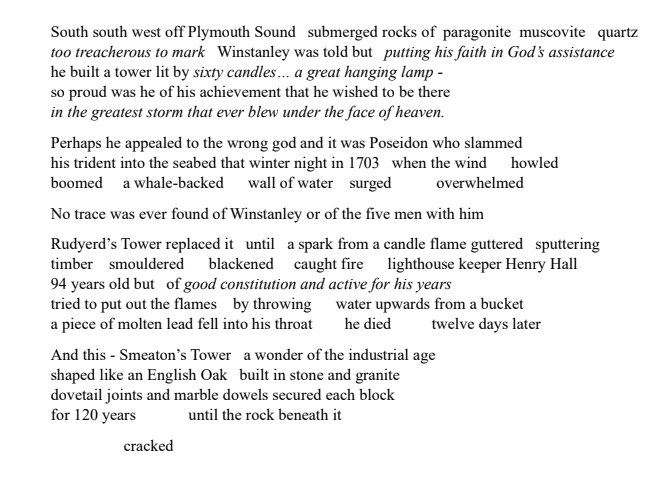 Sue Mackrell Author's note: Words in italics are from contemporary sources. Sue Mackrell lives in Leicestershire, UK. She has an MA in Creative Writing from Loughborough University. Retirement from teaching and facilitating Creative Writing workshops gives her more time to write. Her poems have been published several times in The Ekphrastic Review and Agenda, also recently in Bloody Amazing (Dragon Yaffle) Diversifly (Fair Acre Press) Whirlagust III (Yaffle) and online in Words for the Wild. Canticle of Dreams Like a fist unclenched a leaf falling the balance of attention lapsed I slide wordlessly down past the surface into the dark ocean of sleep where bright fish rise finned and scaled the shimmering glint of sequins winking in glittering spangles that catch whatever light shines through the water my dreams fantastical and strange as their ancient shapes whispering without sound like liquid hieroglyphs antiphon to the long songs of whales that fill me with a desperate longing to stay here with them and learn to breathe without air Mary McCarthy Mary McCarthy is a retired Registered Nurse who has always been a writer. Her work has appeared in many journals and anthologies, including The Ekphrastic World, edited by Lorette C. Luzajic, The Plague Papers, edited by Robbi Nester, and recent issues of Gyroscope, 3rd Wednesday, Caustic Frolic, the Blue Heron Review, and Verse Virtual. Her collection How to Become Invisible will come out from Kelsay early next year. A glass of words from the kitchen tap I hold its story in my mouth, just long enough for the taste of clean to paddle on my tongue, to hear the echo of pins-and-needle rain. A hint of salt swaddles my throat, tells of another latitude, a time before your dark. It doesn’t seem to matter how many times I go to the tap to refill your glass; it remains full of wordless words, empty. Sandra Noel Sandra Noel is a poet from Jersey, Channel Islands. She enjoys writing about the ordinary in unusual ways, nature themes and her passion for sea swimming weaving through many of her poems. Sandra has poems featured online and in print magazines and anthologies. This year she has been longlisted by Mslexia Women’s Poetry Competition 2023, highly commended in The Yaffle Press Competition 2023, and commended in Poetry on the Lake’s Haiku competition 2023. Two of her poems are currently on the buses in Guernsey as winners in the Guernsey International Poetry Competition 2022. Sandra is working on her first collection. What the wind knows Even when the sea is turning inside out, and the ferry lurches green folk starboard, the bottle on the table knows how to hold the wine in the shape of itself; in the way a shadow holds the shape of the wave just long enough, until it crashes back to itself, and the boat lurches port side. Sandra Noel The Mariana Trench He dreamed himself through layers of dark, all smudge and pitch-black night penetrating the earth’s mantle in search of its core, he fell deeper and darker past trees, houses, the clock on the tower which faded as he passed dream-memories shapeshifted objects into pure form as if creating road signs to nowhere memories of gardens – flowers, leaf, petal and stem, some formed like the rays of the sun turned into symbols of loss. Only the fish, magical and singular, appeared to know where they were going as if connected by a sizzling current. Aglow, as if lit from inside by lanterns carried in children’s hands. Onward his body drifted amongst the shapes, weightless and heavy at once. Imagining his own phosphorescence, he sunk deeper and darker through time and space out of the known. Over 11,000 meters deep – to a depth even his dreams could not fathom. Barbara Ponomareff Barbara Ponomareff lives in southern Ontario, Canada. By profession a child psychotherapist, she has been fortunate to be able to pursue her lifelong interest in literature, art and psychology since her retirement. The first of her two novellas, dealt with a possible life of the painter J.S. Chardin. Her short stories, memoirs and poetry have appeared in Descant, (EX)cite, Precipice and various other literary magazines and anthologies. She has contributed to The Ekphrastic Review on numerous occasions and was delighted to win one of their flash story contests. the river’s slow face kingfisher cackles from the shadows seeing with ears eyes seek the river’s waking her face turned away view of sky painted pink with dawn just her reflections rosy dreams of cherry blossoms falling drift of mist a glimpse where mist pulls thin dark waters scribbled on river surface a few reeds a slight breeze dabbles at the stillness lifting Janet Ruth Janet Ruth is a NM ornithologist. Her writing focuses on connections to the natural world. She has recent poems in Oddball Magazine, Tulip Tree Review, The Ocotillo Review, Sin Fronteras, Spiral Orb and anthologies including Moving Images: poetry inspired by film (Before Your Quiet Eyes Publication, 2021) and New Mexico Remembers 9/11 (Artemesia Publishing, 2020). Her first book,Feathered Dreams: celebrating birds in poems, stories & images (Mercury HeartLink, 2018) was a Finalist for the 2018 NM/AZ Book Awards. https://redstartsandravens.com/janets-poetry/ Writing with Hokusai tallest mountain a matter of perspective my fragile boat the wave crashes down truth worse than my fears bending prows into the bite of wind bending to fate should I pray or laugh into the howling? salt crusts my face Mt. Fuji diminished below sky full of ash foam reaches like fingers at the wave’s crest all that lies beneath Janet Ruth Final Sky He found her there at sunrise, on the beach, first sighting her from cliffs above the shore, one arm extended – not, though, in a reach, but as the tide had swept her from the floor of churning ocean. For a while he stood and told himself she hadn’t drowned; she slept, that’s all. She’d wake, recovered, and they would be happy once again. And then he wept and fell upon the sand and beat his fists upon the sodden grains and shells and stones amidst the early morning milling mists that struck their clammy chills within his bones. And still the sun rose in that final sky as he strode out to sea, resolved to die. F.F. Teague F.F. Teague (Fliss) is a copyeditor/copywriter by day and a poet/composer come nightfall. She lives in Pittville, a suburb of Cheltenham (UK). Her poetry features regularly in the Spotlight of The HyperTexts; she has also been published by The Mighty, Snakeskin, The Ekphrastic Review, The Dirigible Balloon, Pulsebeat, Lighten Up Online and a local Morris dancing group. Other interests include art, film, and photography.
0 Comments
Landscape: Midnight Swim "You should avoid being too much in the real world, it isn't conducive to happiness... Does nothing of us last when we are dead? For the lucky ones, perhaps love." P.D. James, A Certain Justice How different the boat a lost smile on the water, faintly green in the moonlight. How different the single figure standing in the boat....embracing the wilderness. At a glance, she could be an animal -- long and thin -- a weasel or a stoat or an ermine standing upright on its back haunches its destiny, to be a royal collar in a Renaissance portrait. Looking for the light (a phantom moon slicing darkness) I now realize the solitary figure is a woman hands raised to hold up her hair from the nape of her naked neck. Her hair is dark, still wet though the water is a memory -- conflicted -- the clinging kelp like the whisper of lost love doubling the distance from the shore; then the boat, its fragile size and shape almost unable to support her weight as she takes her place briefly arching her slim body to recall their pleasure his hands sliding down the length of her as he told her what he wanted: to watch her swim, to become a part of the canvas before it demanded his full attention. And as his painting took shape did he feel her loneliness -- insatiable -- as he stripped all other life forms from the picture? They had been lovers; if painted together, sleek and entwined... But no. She is alone her skin like the sheer fabric of a night dress as if she'd stepped from his 4-poster bed instead of the grasses on a hidden shore. Will your palette float? she might have asked, eyeing the water and the caliginous colors he'd used to disguise any fires of incendiary passion. No Love, he'd answered, as if prescient we're eras away from an Age with styrofoam... Years later (ninety years to be exact) after modern art was liberated from Victorian convention would a great grand- daughter recognize the svelte, single figure standing in the boat as a part of her past? Or was the painting's message to be her future -- the oars that were unmoving -- bubble pools in the water indicating fish beneath the surface though they couldn't be identified; in the same way I wasn't identified, alone in Paris writing on the deck of a Dutch boat docked beneath the D'Orsay during a ferocious summer heat wave. Above, tourists with binoculars watched me from a balcony -- est-elle folle ou celebe? And inside, on the walls of the museum, a lone figure, framed, La Solitude -- art in the way Romantics dream of love, its lack, their wilderness. Although bright fish can't be seen in A Midnight Swim their scales shine like preliminary sketches in a spectrum of possibility. Even unconscious (and even unwritten) they are a wish and a promise: the inevitable dawn; the exquisite passion of an inextinguishable hunger as love begins to sizzle in an elemental skillet. Laurie Newendorp Laurie Newendorp lives and writes in Houston. Honoured multiple times by the Ekphrastic Challenge, she found Harrison's La Solitude to be reminiscent of a personal experience: in 1992, stranded in Paris during a heat wave, she stayed on a Dutch Bed & Breakfast boat, The Johanna, docked at the base of the Musee D'Orsay. Alone and struggling to finish a final academic paper (Yeats And The Tarot) necessary for a graduate degree in Creative Writing, she left the boat at night to find food; and to make trans-Atlantic calls to the father of her children. If asked why she continues to love him, after both divorce and his death, she might tell you one reason is that he accepted (and paid for) her nightly calls from Paris before she was able to return to Houston. Thomas Alexander Harrison is said to have created dreamscapes, which is why the atmosphere of La Solitude has a resonance with both "Landscape: Midnight Swim," and the ekphrastic poems in her book of poetry, When Dreams Were Poems, 2020. ** ripples morning fog the canoe slides into grey silence my paddle disturbs the bay the gulls are silent blue heron Egyptian statue among the reeds tide rises fog rests gently on shoulders and lashes bell buoy muffled benediction I am not alone Kat Dunlap Kat Dunlap grew up Norristown PA and now resides in Massachusetts where she is a member of the Tidepool Poets of Plymouth. She received a BA in English from Arcadia University and holds and MFA from Pacific University. She edited two college writing publications as well as the Tidepool Poets Annual. For many years she was Director of the National Writing Project site at University of Massachusetts Dartmouth and is currently the co-owner of Writers Ink of MA. Her chapbook The Blue Bicycle is being prepared for an autumn launch. ** An Abandoned Plot holds a roof, rising bamboos guard empty spaces- drifting crumbs reach the fence where sits the crow in morning breeze. I gaze long at night sky until it begins to talk- until the letters dance in nooks of heaven. I anchor in clear waters- until the stars fall in slow drizzle. My breath in dying mist. Abha Das Sarma An engineer and management consultant by profession, Abha Das Sarma enjoys writing. Besides having a blog of over 200 poems (http://dassarmafamily.blogspot.com), her poems have appeared in Muddy River Poetry Review, Spillwords, Verse-Virtual, Visual Verse, Sparks of Calliope, Trouvaille Review, Silver Birch Press, Blue Heron Review, here and elsewhere. Having spent her growing up years in small towns of northern India, she currently lives in Bengaluru. ** Woods and Waters This night is mine, and all around, the moon is calling me to come...to ride upon the light that kisses night within the earth’s deep moaning. The night is mine, and as I smile, eclipsing day and duty, it’s here I run to sail upon this lake of ebony and silken sun- less beauty of the night, my night.... Here, I am ruler of my realm as all alone I stand, and in the grand- ness of the starlight I am... I am...a traveler of sky and sea, ...of woods and waters. There is no you... nor they... nor us... in this wide world of night, as I stand seeing far away the light of day fast fading in the march of time. But here, each moment stills... to hush the rush and random shouts of mobs and gobs of powers’ red abuse. Here, I stand. Here I am...bare to wear fair sparkles of the night, my night, afloat on dreams of boundless blue where there is no you. L. W. Owen Linda Watson Owen is the Mississippi Poetry Society's 2023 Poet of the Year. Her book, A Gift of Dappled Light, is a compilation containing a variety of her award winning poems and favourites of readers and audiences. It is available through Amazon. ** Finding Solitude in Watery Silence The words are stagnant in my mind like the lily pad clad surface of the pond, and they curl into the shells of my ears and bury themselves in my flesh. A metaphorical parasite that can no longer vocalize, no longer bleed dry the murmurs and stories in the paper and whispers exchanged in ballrooms "She went out to swim at midnight and a fisherman found her body the next morning." An empty boat A sunken oar A discarded dressing gown I could feel the sloshing of the freshwater in my lungs and yet, I could still hear their whispers Still feel the cold, rough hands that pulled me into the boat and the scream that erupted from the old man's throat when he realized I was dead. I was dead. I was dead? The coroner only knew I had no pulse and yet, in the cellar of the morgue on the rusted table, he mumbled to himself about how this “young woman of high society” was found washed up on the bank, tall grasses tangling in my silken hair and mud painting my porcelain skin I had no bruises, no gashes, no strangulation marks, no skin underneath my fingernails. He didn't know if it was by my will or another's that I was no longer alive I didn’t know either. But after concluding my autopsy report and plucking the aquatic larvae from my body he wrapped my body and sent it off in a carriage to be buried and still I couldn’t open my lips to tell him about the maggots in my throat But this is where my memory refuses to fracture like glass and clear because I do not know why I now stand in my boat looking back at my reflection just as I had done nights previous and still remember nothing about who I was. Who I am? My name is a distant memory, this pond a place of my past and yet when the moon rises every night my ghost- the word they scream as they see my figure following the path to the cattails -wanders back to this boat because this small sapling of a lake was my only familiarity But now I see the moon's reflection sewn together across the water's surface with mine and for some reason, I want the moon to see my face more clearly so I hold back my damp hair and pray that the heavens won’t take my soul just yet because just at this very moment I have a new thought, "It truly is such a lovely night for a swim." Lily Wilson Lily Wilson, is a sophomore at the Alabama School of Fine Arts. She enjoys reading, gardening, hiking, photography and drinking excessive amounts of coffee in her free time. She hopes to work in forensic investigation and become a published poet/author when she is older. ** Solitude Blues I once loved a sweet soul her shadow looked like me I once loved a sweet, sweet soul his shadow looked like me We are lost here tonight, the truth we cannot see Who shall save us, You or me? Who shall save us, You or me? I shiver at what the answer might be. Under a full, full moon I hear the earth’s hum Under this bright, bright moon I hear the earth’s hum My heart she beats, yet my fingers are numb. Who shall save us, You or me? Who shall save us, You or me? We shiver at what the answer might be. We are naked and we are afraid We are buck-naked and we are afraid Lord, Lord, won’t you please come to our aid. Jeffrey G. Moss Jeffrey G. Moss was born and bred in Brooklyn, USA. After 32 years guiding 13/14 year olds in crafting their worlds he has finally started following some of his own writer’s advice. His work has appeared in Cagibi, Hunger Mountain Review, Under the Gum Tree, and Hippocampus. Find him on IG @jeffgm. ** The Full Moon Salon Without fail each month The gathering within the cave The wet echo of excited whispers Darkness and dankness Woollen blankets, candles Soft slurp of corks being pulled Candle flames appear like glow worms Tonight the ritual has run too long The wine has run too freely Pale flesh upon wool slumbering In the stillness before dawn I take the boat, find the air Clear, still, silent, deep Moonglow on my skin But you call my name A glow worm bobs at the cave mouth I row back to you Athena Law Athena Law lives in the lush Queensland hinterland (Australia) and her short fiction has been published by the Australian Writers Centre. She likes to tackle baking and gardening projects while she's mulling over the tricky plot points of her first novel. ** After an Afternoon at The World's Columbian Exposition She whistled “The Waltz of the Flowers,” low to weave her way down to the rowboat, as fireflies lit an ease in and out to the rhythm of her steps, her breath, the clear notes of Tchaikovsky. Moonrise, or the last setting sun’s rays catch stillness the moment before movement, the moment a pause before unheralded discovery, the shedding of everything else – the afternoon sun and dust, the latest melodies loud along the midways, the chill of ice cream, the screams of rocking at the top of the Ferris Wheel, the days’ clothes. Light body into flat calm, after this day of celebrating conquest: boats on the water to cross oceans of false discovery, voices recorded like astounding announcements to claim the air, signals of sound alongside her mother’s syllables of punctuated, “My goodness,” and “Well, I never….” Between the stanzas of her steady song, the moon rises above dense trees, the shoreline a dark mouth that will resist swallowing until she makes more of this moment of stasis, clean lines of skin against the cool air at the end of an August day. There’s time because it’s already been awhile since she let the oar drop into the water, balanced herself at the prow until the dark water absorbed her patience, the noise of all the rocking, as the dissipating waves escaped to the definition of wild shoreline. Hear her whistling to ease the waves to stillness. She is not Christopher Columbus, this slant of dusk light on still water no wonder of any new world. Her eyes fill with the ferris wheel, electricity, and the recorded sound of voices, and her mother all a whisper, “Look, honey,” “Listen,” and “Hold this,” sweet vanilla, cold in a waffle wrapped the better to carry and continue so much everything, no solitude, until a day can call it quits, level the earth back to the limited horizon and the bull frogs’ sudden quiet and her whistle lifting. Oh, to release the world of exposition, expectations, and so much wonder, so many wonders to ease out, lose the bank of world event and yammering delights, to stand still, the irony of painted solitude, before the arc of her naked lines that define the body that will break the surface. Michelle Holland Michelle Holland is currently the Poet-in-Residence for the Santa Fe Girls School and the treasurer of NM Literary Arts. She lives in Chimayo, where she gardens, writes poetry and creative non-fiction, and runs the trails from the BLM gate through the barrancas to Truchas. Her poems can be found in literary journals, in print and on the internet, as well as in a few anthologies. She has two book-length collections of poetry, Chaos Theory, Sin Fronteras Press, and The Sound a Raven Makes, Tres Chicas Press. ** Night Music Here is away, and here is home. There are no grasping fingers, no crushing blows-- no crushing blows, only the drumming of wings, the fiddle-plucks of notes in moonlight rills. The moonlight dances, alive-- it embraces me in song, an appoggiatura. An appoggiatura, the shimmer on water, a resolution broken by an owl shriek. The owl shrieks my name in welcome or warning. This is not solitude, only a space without men. I am on my small boat without gods or men, my body is bathed in moonbeams, and I dive. I dive, I dive, I dive, swimming in night music-- here is away, and here is home. Merril D. Smith Merril D. Smith lives in southern New Jersey. Her work has been published in poetry journals and anthologies, including Black Bough Poetry, Acropolis, Anti-Heroin Chic, The Storms, Fevers of the Mind, and Nightingale and Sparrow. Her full-length poetry collection, River Ghosts (Nightingale & Sparrow Press) was Black Bough Poetry’s December 2022 Book of the Month. Twitter: @merril_mds Instagram: mdsmithnj Blog: merrildsmith.org ** Born to Be Wild Believe in the wild before wildness. Speak from a boat. Speak when nudity saw shaded foliage dress the shoreline with a dark hem. Speak for her, elbows raised, hands wedged behind the head. Speak for tranquility, that surface speaks for adventure from a faintly tinted, red face. Believe in wild as a magic carpet ride, flying over sparrows, once a band who sang from a Canadian village buttoned with orchards and cider houses. Believe in gods who say you don’t have to celebrate clothing anymore. You don’t have to celebrate what’s in the closet. How to imagine bare skin is how to touch someone. He is seeking. Or seems lost. Or he is deciding where to land, believing lessons from epic trips that failed. Believe in running with the current, coming whatever way and feeling nature’s coolness as if drinking a truth serum. As if contemplation is a country. As if wind carries time. Believe in the wild before boarding the boat to cast off boring stories from before. Forget the past losses and happy endings, nature is love’s embrace. Whether he will return is hard to know. She likes a delicate wait, a sweet whisper before swallowing. John Milkereit John Milkereit resides in Houston, Texas working as a mechanical engineer and has completed a M.F.A. in Creative Writing at the Rainier Writing Workshop. His work has appeared in various literary journals including Naugatuck River Review, San Pedro River Review, and previous issues of The Ekphrastic Review. He has published two chapbooks (Pudding House Press) and three full-length collections of poems, including most recently from December, A Place Comfortable with Fire (Lamar University Literary Press). ** After All she could think of that moment was that Hemingway story—Nick Adams in that boat with his father, his father rowing away from the Indian camp. She wondered if Nick had heard the same screams, the same croaks of bullfrogs, the plops of startled turtles slipping off rotting logs—the same tremulous bird, its long white wings slapping the shallow water, chopping the air into shimmering ribbons. The sun would not come up over the hills, she was sure of it. But the stars had never been brighter. Late evening, standing at the bow, no one rowing, she felt quite sure no one was coming. Not her father. Not him. She could see the mouth of the river, the river that connected the lake to the ocean—but no signs of life on or under the water, nothing to swallow her. It was there and then she felt free, unpossessed, like that great egret vanishing. Robert E. Ray Robert E. Ray is a retired public servant. His poetry has been published by Rattle, Wild Roof Journal, Beyond Words Literary Magazine, The Ekphrastic Review, and in five poetry anthologies. Robert is a graduate of Eastern Kentucky University. He resides in Georgia. ** At the Edge of the World I watch as you rise with wobbling knees and clutch your wrought head–a greasy knotted clump. A landless and barren sea slips into a chasm swallowing existence as your dingy drifts toward a silent, invisible edge. Panic swallows you like smoke suffocating one last breath till nothing remains. Darkness passes into pale off-gray light close your eyes and an insatiable off-white whale finds you. Do you sense the end? The silent end of the world where direction and time cease. But the oar–buoyant, glowing, pointed… Only take it! it is solid, it is real and light as wind. Take it! Please! Space crouches just beyond sight ushering you into some failing star millions of millions of miles from the nearest failing star. Samuel Schaefer Samuel writes poetry as a hobby, but he hopes to one day publish some of his work. He currently runs a poetry Substack called The Pony Express, where he publishes weekly, original poems. He lives in Tallahassee, Florida. ** Darkness Fell The world she knew behind a curtain of night. The silence swallows her pain. An occasional night fish breaks the water. Small waves lap against the thin hull of the boat. She feels the touch of the water through her bare feet. Her body responds like a Stradivarius to the touch of the bow. The shore an unwelcome memory. She tries to see the light breaking through a blackness that opens with reluctance, resists penetration. They said she’d find a way. The depths are willing to receive her. Rose Mary Boehm Rose Mary Boehm is a German-born British national living and writing in Lima, Peru, and author of two novels as well as seven poetry collections. Her poetry has been published widely in mostly US poetry reviews (online and print). She was twice nominated for a Pushcart. Her latest: Do Oceans Have Underwater Borders? (Kelsay Books July 2022), Whistling in the Dark (Cyberwit July 2022), and Saudade (December 2022) are available on Amazon. A new MS is ‘in the oven’. https://www.rose-mary-boehm-poet.com/ ** Alone (But Not Lonely) She couldn’t help but relish in the hazy dusk settling over the leafy canopies surrounding the river, the last vestiges of sunlight becoming obscured by a misty, gray overcast. Her naked figure, standing at the bow of her canoe, was clad in nothing but a soft smile. Arching as she threw her unruly auburn hair into a lopsided knot, her balance remained unchanged– which must have been the result of dozens of similar escapades onto the river. The sleek, wooden canoe, painted a faded baby blue, rocked gently back and forth in the placid waters. Its gentle curves and slender shape allowed for it to blend in harmoniously with the tranquil environment, but its oars seemed to glow in stark contrast amongst the depth of the glossy, black waters. Humming along to the creaking of the oars and the lyrical symphony of the buzzing cicadas, the lean figure said aloud, to nobody but herself, “It’s such a shame–the description of ‘alone’ inherently carries a negative burden, does it not?” Nobody answered. “I suppose, this may be because of its cunning daughter, ‘lonely’. But I am alone, and yet–I am not lonely.” She broke the silence again. “Oh, the joys of solitude!” Hannah Guo Hannah Guo, is a 15 year old rising junior in high school. She loves music, art, and literature, especially poetry. Her short story won the Platinum Award for Scholastic's National Art and Writing Contest. ** To Alexander Harrison Regarding Solitude As if entombed in darkened space you have her sense immortal grace -- becoming marble carved and left to world, though from her then bereft, that sees by haunting light of moon in eerie silence her lagoon and visage as a dawn foretold of solace newly taking hold where lull of glow and flickered gleam is fading dance of distant dream and blaze arising more direct commands her soul to resurrect the joy that cannot live in stone and oar that no one wields alone. Portly Bard Old man. Ekphrastic fan. Prefers to craft with sole intent... of verse becoming complement... ...and by such homage being lent... ideally also compliment. Ekphrastic joy comes not from praise for words but from returning gaze far more aware of fortune art becomes to eyes that fathom heart. ** Adrift Green dinghy sits light on the still lake, so still I stand at the bow, inhale the heavy night air, stretch my achy back, flex stiff arms, and squeeze the pain from shoulders grown weary from rowing away, away from the noise and haloed lights of shore. I drift into the peaceful deep of darkest night alone, alone. Ann E. Wallace Ann E. Wallace is Poet Laureate of Jersey City, New Jersey. Her new poetry collection, Days of Grace and Silence: A Chronicle of COVID's Long Haul, is forthcoming from Kelsay Books in February 2024. She is author of Counting by Sevens (Main Street Rag) and has published work in Huffington Post, Wordgathering, Halfway Down the Stairs, Snapdragon and many other journals. You can follow her online at AnnWallacePhD.com and on Instagram @annwallace409. ** Retired Goodbye crowd of need I have stopped, dropped my spirit oar into still water leaving you ripples of words left behind as guides to your hidden places no one can find me now I can stand in my own tallness look into my own dark trails eat stillness hear calling voices on my own delightful channels move my eyes toward shore only when and if I want to see your faces waiting for more of me Susan Shea Susan Shea a retired school psychologist who was raised in New York City and now lives in a forest in Pennsylvania. She had the privilege of working with children and families who struggled with disabilities and mental health concerns. A poet since third grade, Susan now feels like she is coming alive again in the free moments of time. She has been published in Plainsongs, Pudding, Poetry Forum Newsletter, Oxalis, The Orange Review, The Accordion Flyer, The Bluebird Word, and The Agape Review. Recently Susan has had poems accepted for four upcoming anthologies. ** Solitude True solitude is difficult. And yet, it flows freely across vast stillness, reluctant to draw hard and fast borders. I stand against the dark yawn of night, my boat a silver slant, a dim raft between water, shore, and sky. Leaves flung across sheets of glass over my moonlit image: its curvature illusory, variable, unknowable. My solitary posture bows, elusive to rest and towards the restlessness of night’s creatures. Elanur Eroglu Williams Elanur Eroglu Williams holds a B.A. in English Literature and Creative Writing, and a minor in Sustainability Studies from Concordia University Montreal. In addition, she has a M.Phil. in Children's Literature from Trinity College Dublin, and a M.S.Ed. in Reading/Writing/Literacy from the University of Pennsylvania Graduate School of Education. She has worked as an elementary school teacher and educator, and is currently based in New York City. ** Join us for biweekly ekphrastic writing challenges. See why so many writers are hooked on ekphrasis! We feature some of the most accomplished, influential writers working today, and we also welcome emerging or first time writers and those who simply want to experience art in a deeper way or try something creative. The prompt this time is Homage to Nina Simone, by Bob Thompson. Deadline is August 4, 2023. You can submit poetry, creative nonfiction, flash fiction, microfiction, or any other form creative writing you like. 1000 words max please. The Rules 1. Use this visual art prompt as a springboard for your writing. It can be a poem or short prose (fiction or nonfiction.) You can research the artwork or artist and use your discoveries to fuel your writing, or you can let the image alone provoke your imagination. 2. Write as many poems and stories as you like. Send only your best works or final draft, not everything you wrote down. (Please note, experimental formats are difficult to publish online. We will consider them but they present technical difficulties with web software that may not be easily resolved.) Please copy and paste your submission into the body of the email, even if you include an attachment such as Word or PDF. 3. There is no mandatory submission fee, but we ask you to consider a voluntary donation to show your support to the time, management, maintenance, and promotion of The Ekphrastic Review. It takes an incredible amount of time to curate the journal, read regular and contest submissions, etc. Paying all expenses out of pocket is also prohibitive. Thank you. A voluntary gift does not affect the selection process in any way. 4. USE THIS EMAIL ONLY.
Send your work to [email protected]. Challenge submissions sent to the other inboxes will most likely be lost as those are read in chronological order of receipt, weeks or longer behind, and are not seen at all by guest editors. They will be discarded. Sorry. 5.Include THOMPSON CHALLENGE in the subject line. 6. Include your name and a brief bio. If you do not include your bio, it will not be included with your work, if accepted. Even if you have already written for The Ekphrastic Review or submitted other works and your bio is "on file" you must include it in your challenge submission. 7. Late submissions will be discarded. Sorry. 8. Deadline is midnight EST, August 4, 2023. 9. Please do not send revisions, corrections, or changes to your poetry or your biography after the fact. If it's not ready yet, hang on to it until it is. 10. Selected submissions will be published together, with the prompt, one week after the deadline. 11. Due to the demands of the increasing volume of submissions, we do not send out sorry notices or yes letters for challenge submissions. You will see what poetry and stories have been selected when the responses are posted one week after the deadline. Understand that we value your participation as part of our ekphrastic community, but we can only choose a handful of the many entries we receive. 12. A word on the selection process: we strive for a balance between rewarding regular participants and sharing the voices of writers who are new to our family. We also look for a variety of perspectives and styles, and a range of interesting takes on the painting. It is difficult to reproduce experimental formatting, so unfortunately we won't choose many with unusual spacing or typography. 13. By submitting to The Ekphrastic Review, you are also automatically joining our subscribers' list. Your submission is your permission. We don't send spam and we don't send many emails- you will not receive forty-four emails a day! Our newsletter occasionally updates you on some of the challenges, news, contests, prize nominations, ekphrastic happenings, prompt ebooks, workshops, and more. 14. Rinse and repeat with upcoming ekphrastic writing challenges! 15. Please share this prompt with your writing groups, Facebook groups, social media circles, and anywhere else you can. The simple act of sharing brings readers to The Ekphrastic Review, and that is the best way to support the poets and writers on our pages! 16. Check this space every Friday for new challenges and selected responses, alternating weekly. Dear Everyone, This intriguing artwork spoke just as loudly to so many of you, as it did to me. We received so many wonderful interpretations of this piece. Once again, it was a painful process selecting, and I'm so sorry to have left out so many fine submissions. I'm not surprised that this work inspired you. We can't help but enter into the painting immediately because as soon as we look at it, our mesmerising redhead is staring right back at us. Fioretti's sweeping dance of light and shadow shows us the others present, but like the men on both sides of her, we can't look away for long. The Ekphrastic Review turned eight this month. I just wanted to say thank you for making this ekphrastic adventure happen. We have created unimaginable wealth together, an enormous body of work on art of all kinds. We have looked at paintings and other creations from all over the world, contemplated them, and let them speak through us. We have created new worlds inspired by the imagination of artists and of each other. We have taken deep dives into themes in art, and we have gathered by Zoom to talk about amazing artists and to write together. Many of you have created collections of ekphrasis and published them, or sprinkled your books with ekphrastic morsels in between other poems and stories. We have become friends. We have become a family. Thank you all, and welcome to everyone who is stopping by for the first time. love, Lorette Art Deco Party Night When I think of us now I think of Art Deco Party Night. Whose idea was it to celebrate a past that thought it was the future? We dressed for it - like an antique photograph of fun: a flapper and her man in search of a charleston. We dined among the tiered skirts, rhinestones, cloche hats; drank gin from a silver teapot. Your beads swung low when you danced, and the jazz seemed to signify a lost idea of happy: the sort we inherited along with modernity. I still recall your eyes on your return to our table, kohl-lined and beautiful: they grabbed every photon in the room, and knew their own future. By the end of the night I knew it too, and it failed to contain me. Paul McDonald Paul McDonald taught at the University of Wolverhampton for twenty five years, where he ran the Creative Writing Programme before taking early retirement in 2019. He is the author of 20 books to date, which includes fiction, poetry and scholarship. His most recent poetry collection is 60 Poems (Greenwich Exchange Press, 2023) ** Paean to Phalaena You can’t help but see her in the centre flaming red, curve-lit, painted like a cinnabar moth. How she turns faces, but she’s pointing at you. Yes, you. She warns with toxic glow, brazen stance, screen of silk bling wings. Her markings and eyes hypnotise and if you cut her she’d bleed poison. Venom already flows through your veins like a thought stream and you know one kiss would be lethal, yet all you can think of is her magnetic fire. Helen Freeman Helen Freeman has been published on several sites such as Visual Verse, Ink, Sweat and Tears, Red River Review, Barren Magazine, The Drabble, Sukoon and The Ekphrastic Review. Her instagram page is @chemchemi.hf. She lives in Durham, England. ** Sí, Señor Sí, señor. Once again I fly close to your orbit in disgust and hunger. You think I’m captured but I won’t enter your smug vest in which you carry around vain attitudes and vacuous schemes. When I undo your supercilious bowtie later tonight, as always, I’ll imagine it being spun into a scarf that I can use to fasten your mouth. For the short time we’ll be together, I’ll restrain my tremendous urge to slide up to the chest of drawers in the hostal of your choice where a gas lamp pulsates, and I long to douse my translucent shawl until it catches and carries me away from you forever. Sharon Roseman Sharon Roseman writes poetry, non-fiction, and fiction. She’s a professor of anthropology at Memorial University in St. John’s, Canada and a keen admirer of visual art. Her poems and micro-fiction can be found in Poetica Magazine, CuiZine, and Found Polaroids. ** The Eyes of Anazit If you thought her name was Phalaena, you’d be wrong. Phalaena is his name. It’s his nickname, actually. Phalaena is a Greek word. It means whale, and he donned the name for the endearment it was meant to be when she used those eyes to seduce him. But that was several years ago. “Aye! Mi dulce y fuerte ballena,” she whispered in his ear, the first night of their love-making. Phalaena is every bit as prosperous in money and material assets as his girth suggests. Oh yes, he has charm, too, but Anazit was far more attracted to the charm of his bank account, and presently even that fails to engage her interest. Me? I’m a painter. You might say I am to Madrid what Toulouse-Lautrec was to Paris--a fly on the walls of café society, sketching out life in the moment. Tonight though, Phalaena and Anazit are of secondary importance to my eye. Tonight my every brush stroke serves to capture the incandescent glow of the brazier, its metal heated out of check. Do you see how its luminosity spills over the tea pot and tip-toes up Anazit’s arm; how it rests on her cheek then crawls into her red hair? How it softly flows through the folds of her cape draped over the chair? That brazier sheds its brilliance throughout the scene before me and causes me to trace it to the look of longing in the eyes of that gentleman at the table next. His own companion has turned away in delightful reunion with another. Those two women are heedless of the comforting heat being provided from Phalaena and Anazit’s table. Heat, yes—just enough to cause a modest burn to rest on Phalaena’s face, but heat too little to lessen the arch in his eyebrow and the suspicion in his eyes. Anazit has rallied every ounce of her ennui to posture herself for another. She rests her eyes on me. She is posing for me, oblivious to the fact the brazier is the point of my infatuation. I have to ask, would her eyes be as captivating without the play of the brazier’s glow? They would, indeed. They are the eyes of one who seeks, which is how she came to be called Anazit, short for anazititis, the Greek word for seeker. Little did her parents know though, upon the day of her baptism, that Anazit would grow up to be seriously short sighted. Karen FitzGerald Karen FitzGerald is a genre fluid writer whose works have been declined by some of America's most prestigious publishing houses. She is undaunted. ** "Emillie," aka “The Moth” Phalaena wasn’t her name, but rather a description of her body. Her visage, composed of taut muscle, long legs, and thin, wing-like arms had reminded some drunken, forgotten man of the Phylum Phalaena Moth. Now thumbtacked to this horrible moniker, she was forced to carry it. Moths are known to singe themselves to death flying too close to the flames of an open fire, and so the similarities continue: Emille’ has always sidled up close to that which threatened to destroy her, certain she had the upper hand. Her Grandmere’ used to say “Trop jeune pour savoir, trop vieux pour e’couter.” (Too young to know, too old to listen) Her eyes were also Lepidopteran, bulging disks of anxious pools that fairly jumped off of her face, a disturbance of coalescence, protubing like orbs foretelling a destiny which she loathes and yet seems powerless to change. Terrorized, Emillie’s eyes record no casual memories. Each day, she marks her calendar with a number: usually three, sometimes five, and on a lucky day, two. Today, this bloated, boozy homme de famille, (family man) this cochon, (pig) is number four. They were always the worst, those with wives and daughters, those with respectable jobs, pent-up anger pointing at her with half-mast swords. Oh! He was almost as ugly as she felt herself to be, with that despicable nickname, Phalaena, a genus of moth soon to be rendered obsolete. “What next” thought the moth, Flying too close to the flames As pretty fire danced. Debbie Walker-Lass Debbie Walker-Lass, (she/her) is a poet, collage artist, and writer living in Decatur, Georgia. Her work has appeared in The Ekphrastic Review, Poetry Quarterly, Haikuniverse, The Light Ekphrastic and Natural Awakenings, Atlanta, among others. She has recently read live for The Poet’s Corner. Debbie loves beachcombing on Tybee Island and hanging out with her husband, Burt, and dog, Maddie. ** Over Cigarettes and Orujo Even if Spain had fought, he would’ve been too fat old and rich to fight. So, he bragged about his bull days, and how he’d been nearly gored twice in Pamplona. She knew it was a lie. He didn’t need to impress her; he’d paid her for the entire evening. This wasn’t the life any mother dreamed of for her daughter. “Anna, you will go to school,” her mother said over cigarettes and orujo. Her mother was dead but not what she’d said. When Anna told the man, he laughed aloud. They were both drunk, and he wanted nothing but her body. She couldn’t do it sober she told the painter; so, he paid the man what he’d paid her, and they left hours after. Rain fell from black clouds, and that caked black paint ran down her face-- moths vanishing in the gas-lit street lamps. “Always look up, Anna,” her mother said, but never directly into the light.” Robert E. Ray Robert E. Ray is a retired public servant. His poetry has been published by Rattle, Beyond Words Literary Magazine, Wild Roof Journal, The Ekphrastic Review and in four poetry anthologies. Robert lives in coastal Georgia. ** You Can’t Always Get What You Want But you could talk to the blue-shadowed tablecloth and its red lamps bathing the evening glow. You could try to touch the woman’s arm, winglike, who is fatally attracted to fire. You could offer to pour her wine left in the bottle-- hopefully, not the troubled, passed-over sips of Spain. The gaze and graceful contours of a coterie. The glaze of look-up smiles and look-back glances. And if I could, I would act as the uninvited guest, which is not exactly acting, but pretending as a mysterious, swirling broth would from cabbage, turnips, and marrow bones while cooking cocido. A stock pot with cured meat ready for your purity. You could enjoy the clever, camouflage of a tuxedo—a suit flush of countershading—to look like a penguin, waterproofing feathers from a secret gland even though I know it’s hair oiled from a hidden bottle. You could forget that cologne face. You could dilate your eyes and not be escorted. You could find love, if not here, then as an embrace, gusts of awareness. Sing and pray. You can see towards heaven past the unfinished cathedral spires. You could try to unfasten her disorder. You can’t choose who sits at the table; her chair was the last available, or maybe you blundered in later. You can’t expect a teapot to pour. You can’t expect the sugar cubes to plop in the cup. The cigarette is a bad chimney. And if it’s troubling that more decades rumble by, you can still remember the dark brown fur of a moose roaming the thin, forest floor on an island in boyhood, and chocolate chips snuck from a crinkly bag when your mother wasn’t looking. That rock and roll song is burned into your skin, like your father’s voice, the semisweet, bluesy advice. You get what you need. The woman stares until she turns to you, her face aglow, she says: You wouldn’t understand. You know. You know before she flies away. John Milkereit John Milkereit resides in Houston, Texas working as a mechanical engineer and has completed a M.F.A. in Creative Writing at the Rainier Writing Workshop. His work has appeared in various literary journals including Naugatuck River Review, San Pedro River Review, and previous issues of The Ekphrastic Review. He has published two chapbooks (Pudding House Press) and three full-length collections of poems, including most recently, A Place Comfortable with Fire(Lamar University Literary Press). ** Hours After a Watermelon Sunrise This afternoon after leaving Hotel Regina, I plan a stop at Murillo Café for a late lunch. Outside under the cloth awning, I will order sesame crusted tuna which the server will deliver to a blue metal table where I am seated. Yesterday when I joined a guided tour at the Museo del Prado, intently studied Fioretti’s Phalasna, I tried to discern the reason for Madame’s annoyed expression, her martini glass almost empty, her cigarette still burning. While I stood mesmerized in front of that masterpiece, the museum guard stared attentively. I was unaffected by the scrutiny he was giving me as my mind played Ain’t Misbehavin’, that jazz hit of the Twenties, before I continued through the museum to observe other famous paintings by Greco, Goya and Rubens. Dr. Jim Brosnan Dr. Jim Brosnan’s first poetry and original photography collection, Nameless Roads, was traditionally published in 2019 (Moon Pie Press). He has had over 600 poems published in the United States, Ireland, Canada, Wales, India, Singapore, and the UK. Jim is a Pushcart nominee, a finalist in the Blue Light Chapbook Contest, and has won several awards in the National Federation of State Poetry Societies’ annual competitions, including a first place in 2021. Jim holds the rank of full professor in the English Department at Johnson & Wales University. drjimbrosnan.com ** I Dare You, Pretty Please I am the Ice Queen immune to the pins and pricks of your whimsical touch let me voodoo you with my torch Beware, would-be lover my fiery, frigid stare my raven eyes all aflicker like Icarus, your lust is my must Count to three, oh so slowly drawing in my finespun scent as I scatter smoke signals like Sirens yet be careful lest you choke Lean in a bit closer, dear and graze my pearly, lilac skin let my blood-orange inferno ignite your thirst from within Inhale deeply my bouquet, my love but not without a fee just try to dodge my silky lair I dare you, pretty please. Ann Marie Steele Ann Marie Steele, who resides in Charlotte, NC, America, is a writer who dabs in poetry, essays, and short stories. She holds a BS in Journalism (News-Editorial), and an MA in Secondary English Education. Although Ann Marie works as a high school English/Special Education teacher, she has a passion for writing poetry. She pens pieces about love and loss, and what she observes and experiences. The loss of her youngest son has deeply impacted her writing, which has been described as resiliently defiant. Having published more than 200 pieces on Medium.com, she was recently published in The Ekphrastic Review with her piece, “Every Lilly Donned with Grief.” When not writing or teaching, Ann Marie is an avid participant of Acro yoga aka Partner Acrobatics, where she can often be seen flying and hand-standing upside down just for kicks. ** False Attribution The lad’s soldier is marched out the door. The canvas is despatched. Prado! A Spanish flee. For, seeing the uninvited guest Concha’s contribution is censorious. And critical. Crucial. Crossroads warrant cross words. Are those fellows careless, carefree? Uncurating - present participle, supposedly unknown. Men canvassed are proved the majority view. Exhibitionism, as they exhibit women’s art. The latter (of course) fulfil their expected clichéd rôles - miniature decorators, seen fillers, scene as most chaps see them. Flighty moths of the night playing with fire? Are we observing how life has been and censuring ourselves? Are we observing how life has been but should censor ourselves? Who is careful? And what is fragile? Heterocera? Lepidoptera without butterfly wings? Or ego mindsets? Who should pull the cloth away and upend the table? To reiterate the past scenes more difficult than we thought, unless the iteration is reconfirmation. Phalaena - left over type, as classified. Collaborator, colluder, victim, survivor, at table with another uninvited guest? Not sharing a table. Who would want ruddy smoke in their eyes? Or see the mirrors already in other’s eyes? Pupils can be fast learners. False attribution is too easy by half. Stephen Kingsnorth Stephen Kingsnorth (Cambridge M.A., English & Religious Studies), retired to Wales, UK, from ministry in the Methodist Church due to Parkinson’s Disease, has had pieces published by on-line poetry sites, printed journals and anthologies, including The Ekphrastic Review. His blog is at https://poetrykingsnorth.wordpress.com/ ** Indetermination She needs a plan should she decide to leave this scene no longer fun, this man who brought her here again, who let her long believe she could aspire to more than what she ought. Right now, she cannot even look at him, at anyone. How foolish she has been by acting moth-like on another’s whim, by serving as amusement now and then. He never will be more than what he is, base metal underneath a coat of gild. She holds a cigarette, not one of his; the empty glass beside her goes unfilled. She glowers since she wants to tip her chair, grab all belongings, head for some elsewhere. Jane Blanchard A native Virginian, Jane Blanchard lives and writes in Georgia. Her collections include Never Enough Already (2021) and Sooner or Later (2022). ** Moths at Midnight as jazz sways over decadent tables she holds my gaze, this painted lady wrapped in the drape and fold of wings nectar in glass, beads of possibility nestled in the scoop of her breast and shades of cyan bright in neon a man leans into the club cocoon his suited elbow angled in, eyes fixed on the splendid specimen centre right golden highlights in her hair, a glare transcending the flutter of moths winging the frame of femininity Kate Young Kate Young lives in England and enjoys writing poetry, painting and playing the guitar and ukulele. Her poems have appeared in various webzines, magazines, and chapbooks. Her work has also featured in the anthologies Places of Poetry and Write Out Loud. Her pamphlet A Spark in the Darkness has been published by Hedgehog Press and her next pamphlet Beyond the School Gate is due to be published in the next month. Find her on Twitter @Kateyoung12poet. ** Phalaena You think she’s looking at you, but she only sees the light reflected in your eyes; feels the moth’s attraction to the flame, expects it too will be the death of her. Thinks there are worse ways to go. Her protector has made yet another demand and she must decide how much more of herself she can afford to lose. The kohl collected below her lids─ how many times has he caused her to cry tonight? She stares at you as if you know, as if you are her last chance. It’s too intense, that look, and you blink back the image in your pupils of the moth singeing its wings in the fire. She shrugs and turns back to the man. The moth, its beauty seared the moment it swept into the spark, has an answer for her. Cheryl Snell Cheryl Snell's books include several poetry collections and the novels of her Bombay Trilogy. Her latest title is a series called Intricate Things in their Fringed Peripheries. Most recently her writing has appeared in Gone Lawn, Impspired, Necessary Fiction, Pure Slush, and other journals. A classical pianist, she lives in Maryland with her husband, a mathematical engineer. ** Phalena Torture listening to this boor. Boring beyond belief! Captain of all he surveys– or so he thinks. Arrogant ass. His disposition is like his cigar: difficult, smelly, entitled. He may buy champagne, but he will never own me. I am thin to his thick, wrapped in translucent wrap, drawn to the flame of drink, dining, music, dancing. If only he was not the reason I am here. Lynne Kemen Lynne Kemen lives in Upstate New York. Her chapbook, More Than a Handful was published in 2020. Her work is anthologized in Seeing Things (2020) and several others. She is published in Silver Birch Press, The Ravens Perch, Fresh Words Magazine, Spillwords, Topical Poetry, Lothlorien Poetry Journal, and Blue Mountain Review. Lynne stands on the Board of Bright Hill Press. She is an editor for the Blue Mountain Review and a lifetime member of The Southern Collective Experience. Her book of poetry will be published in 2023 by SCE. ** poetic exiles on the voyage out you’re a mean ol lady funned jimmy joyce virgin woolf roosted beside him in the temple bar looking over la seine like swiggers caught in the net your words are lead woolf growled glazed with guilt confused like you they amuse & bore joyce groused i prefer blondes in rooms of their own making tosh woolf howled at a waxing moon knurled fingers caressing cane’s carved phalaena moth obsolete lepidoptera aliens from dublin & london bred & dead same month same year they two flutter over the waves to finnegans lighthouse leaving no room for jesus Donna-Lee Smith Donna-Lee Smith, way back when Earth was blue (not alage green) and TV black and white, had a most-loved prof at Concordia University (Montreal): Michael Brian, a Joycean scholar. While gorging on Joyce, D-LS fattened her studies to include Woolf and Atwood. Answer me this fellow lovers of the smitten word: Why has Atwood not received the Nobel??? ** The Stare Serious, seductive, sensuous. Faux fragility betrayed by a sapphire stare. The evening ambiance no longer infused with swollen indifference. Bathed in a central glow, the architectural arch of your arms is ready to envelop. Voracious vigour, tempting and teasing, clothed in diaphanous distraction. The challenge of your glare declares a delicate passion that solicits satisfaction. Time and again, it is said, the moth flies to the flame. I become another statistic. Enticed then ensnared by nocturnal charm, the hubbub becomes peripheral, and all else is rendered redundant. Henry Bladon Henry is a poet, writer and mental health essayist based in Somerset in the UK. He has appeared previously in The Ekphrastic Review. ** Blue Butterfly Captured and categorized as a trophy to wealth and control netted as a prize along with fancy restaurants and big cigars; her wings are more beautiful when spread released from the blue smoke and lechery she stares with unveiled freedom out of the frame toward the eyes of the artist who lifting an eyebrow nods toward the exit and fragrant valley orchids. Daniel Brown Daniel Brown began writing poetry as a senior and is especially interested in ekphrastic poems and those with musical themes. He's been published in a variety of journals, has hosted a Youtube channel titled Poetry From Shooks Pond and at age 72 published his first collection, Family Portraits In Verse. through Epigraph Books, Rhinebeck NY. He can be contacted at [email protected]. ** Night Phoenix They have a name for girls like her, a name that sounds like some dead and rotting thing in the gutter. The dead and rotting thing in the gutter once had wings, its feathers scattered by the wind. The wind of passing limousines scattered her gaudy feathers, spattered her painted face with mud. She caked the paint thick as mud to hide the dirt she felt the world must see, the dead eyes, because the world sees only dead eyes in girls like her, never the wings torn from magazines to escape a prison. If only wings of strass and gauze could change a world, beat high and bold, carry lost girls somewhere bright. All hearts with beating feather-wings belong in the shining blue. They have a name for girls like her, Phoenix birds. Jane Dougherty Jane Dougherty lives and works in southwest France. A Pushcart Prize nominee, her poems and stories have been published in magazines and journals including Ogham Stone, The Ekphrastic Review, Black Bough Poetry, ink sweat and tears, Gleam, Nightingale & Sparrow, Green Ink and Brilliant Flash Fiction. She blogs at https://janedougherty.wordpress.com/ Her poetry chapbooks, thicker than water and birds and other feathers were published in October and November 2020. Join us for biweekly ekphrastic writing challenges. See why so many writers are hooked on ekphrasis! We feature some of the most accomplished, influential writers working today, and we also welcome emerging or first time writers and those who simply want to experience art in a deeper way or try something creative. The prompt this time is Solitude, by Alexander Harrison. Deadline is July 21, 2023. You can submit poetry, creative nonfiction, flash fiction, microfiction, or any other form creative writing you like. 1000 words max please. The Rules 1. Use this visual art prompt as a springboard for your writing. It can be a poem or short prose (fiction or nonfiction.) You can research the artwork or artist and use your discoveries to fuel your writing, or you can let the image alone provoke your imagination. 2. Write as many poems and stories as you like. Send only your best works or final draft, not everything you wrote down. (Please note, experimental formats are difficult to publish online. We will consider them but they present technical difficulties with web software that may not be easily resolved.) Please copy and paste your submission into the body of the email, even if you include an attachment such as Word or PDF. 3. There is no mandatory submission fee, but we ask you to consider a voluntary donation to show your support to the time, management, maintenance, and promotion of The Ekphrastic Review. It takes an incredible amount of time to curate the journal, read regular and contest submissions, etc. Paying all expenses out of pocket is also prohibitive. Thank you. A voluntary gift does not affect the selection process in any way. 4. USE THIS EMAIL ONLY. Send your work to [email protected]. Challenge submissions sent to the other inboxes will most likely be lost as those are read in chronological order of receipt, weeks or longer behind, and are not seen at all by guest editors. They will be discarded. Sorry. 5.Include HARRISON CHALLENGE in the subject line. 6. Include your name and a brief bio. If you do not include your bio, it will not be included with your work, if accepted. Even if you have already written for The Ekphrastic Review or submitted other works and your bio is "on file" you must include it in your challenge submission. 7. Late submissions will be discarded. Sorry. 8. Deadline is midnight EST, July 21, 2023. 9. Please do not send revisions, corrections, or changes to your poetry or your biography after the fact. If it's not ready yet, hang on to it until it is. 10. Selected submissions will be published together, with the prompt, one week after the deadline. 11. Due to the demands of the increasing volume of submissions, we do not send out sorry notices or yes letters for challenge submissions. You will see what poetry and stories have been selected when the responses are posted one week after the deadline. Understand that we value your participation as part of our ekphrastic community, but we can only choose a handful of the many entries we receive. 12. A word on the selection process: we strive for a balance between rewarding regular participants and sharing the voices of writers who are new to our family. We also look for a variety of perspectives and styles, and a range of interesting takes on the painting. It is difficult to reproduce experimental formatting, so unfortunately we won't choose many with unusual spacing or typography. 13. By submitting to The Ekphrastic Review, you are also automatically joining our subscribers' list. Your submission is your permission. We don't send spam and we don't send many emails- you will not receive forty-four emails a day! Our newsletter occasionally updates you on some of the challenges, news, contests, prize nominations, ekphrastic happenings, prompt ebooks, workshops, and more. 14. Rinse and repeat with upcoming ekphrastic writing challenges! 15. Please share this prompt with your writing groups, Facebook groups, social media circles, and anywhere else you can. The simple act of sharing brings readers to The Ekphrastic Review, and that is the best way to support the poets and writers on our pages! 16. Check this space every Friday for new challenges and selected responses, alternating weekly. Join our second annual ekphrastic marathon! Click here or on image for details. Alternative options available for those who can't make the date.
|
Challenges
|
